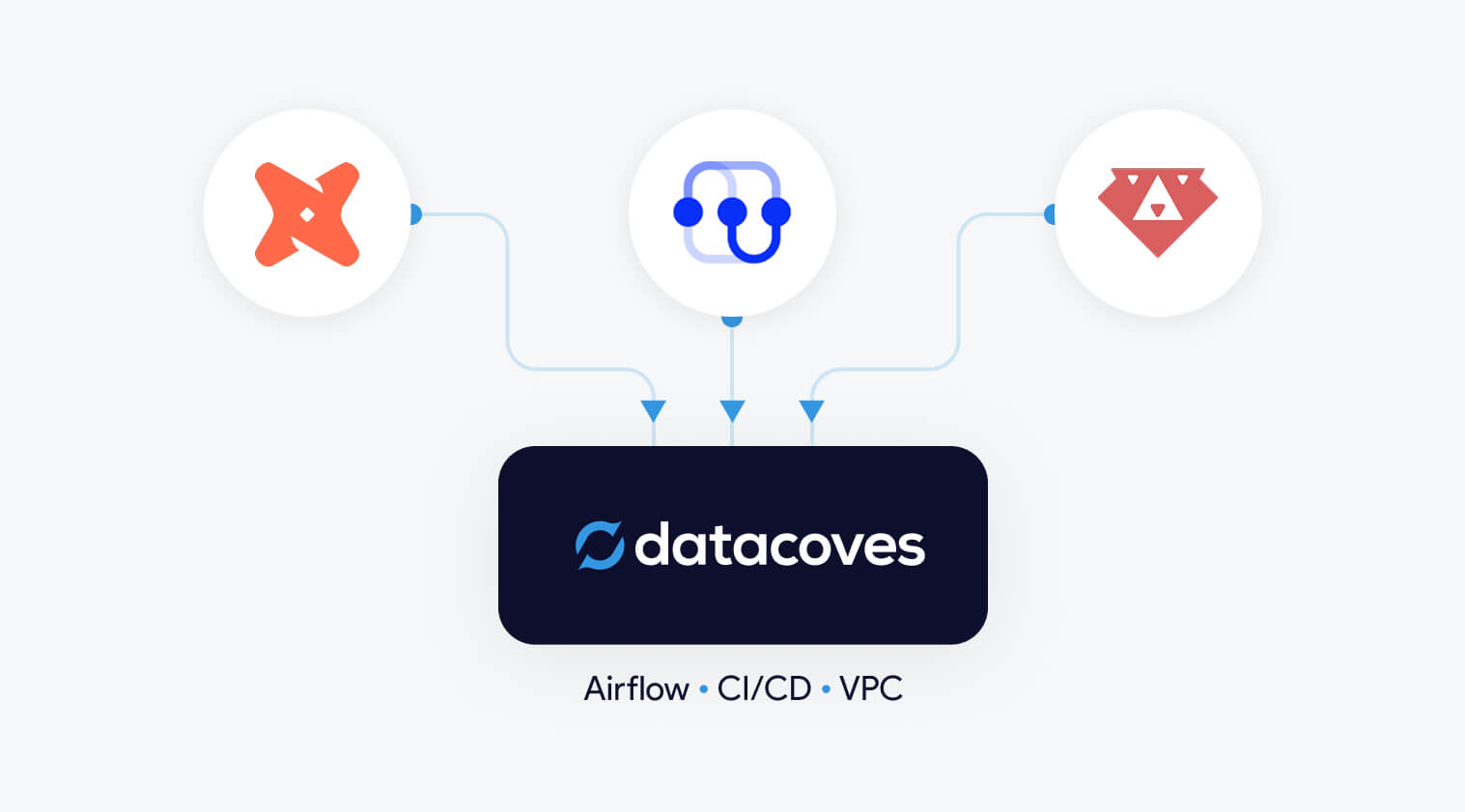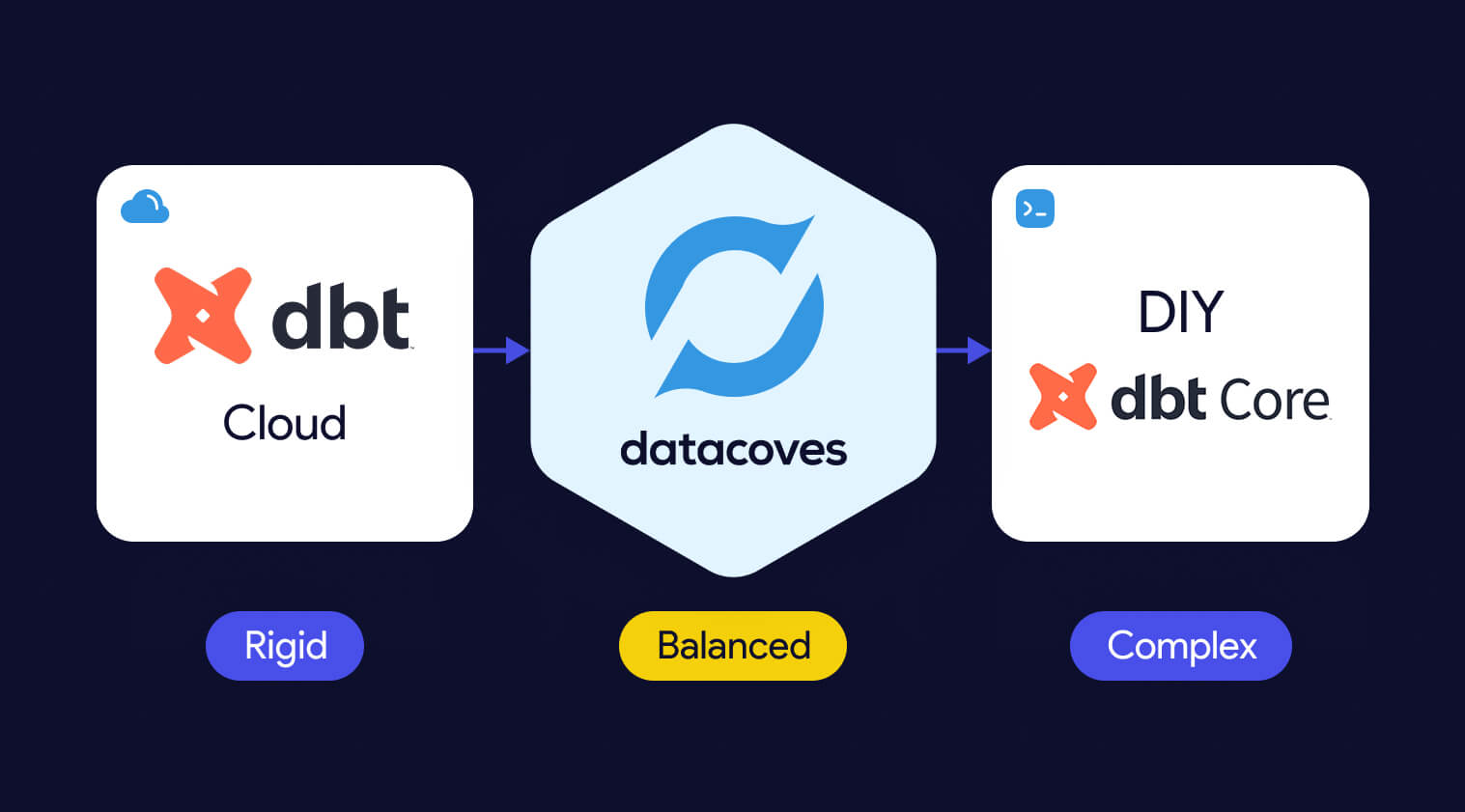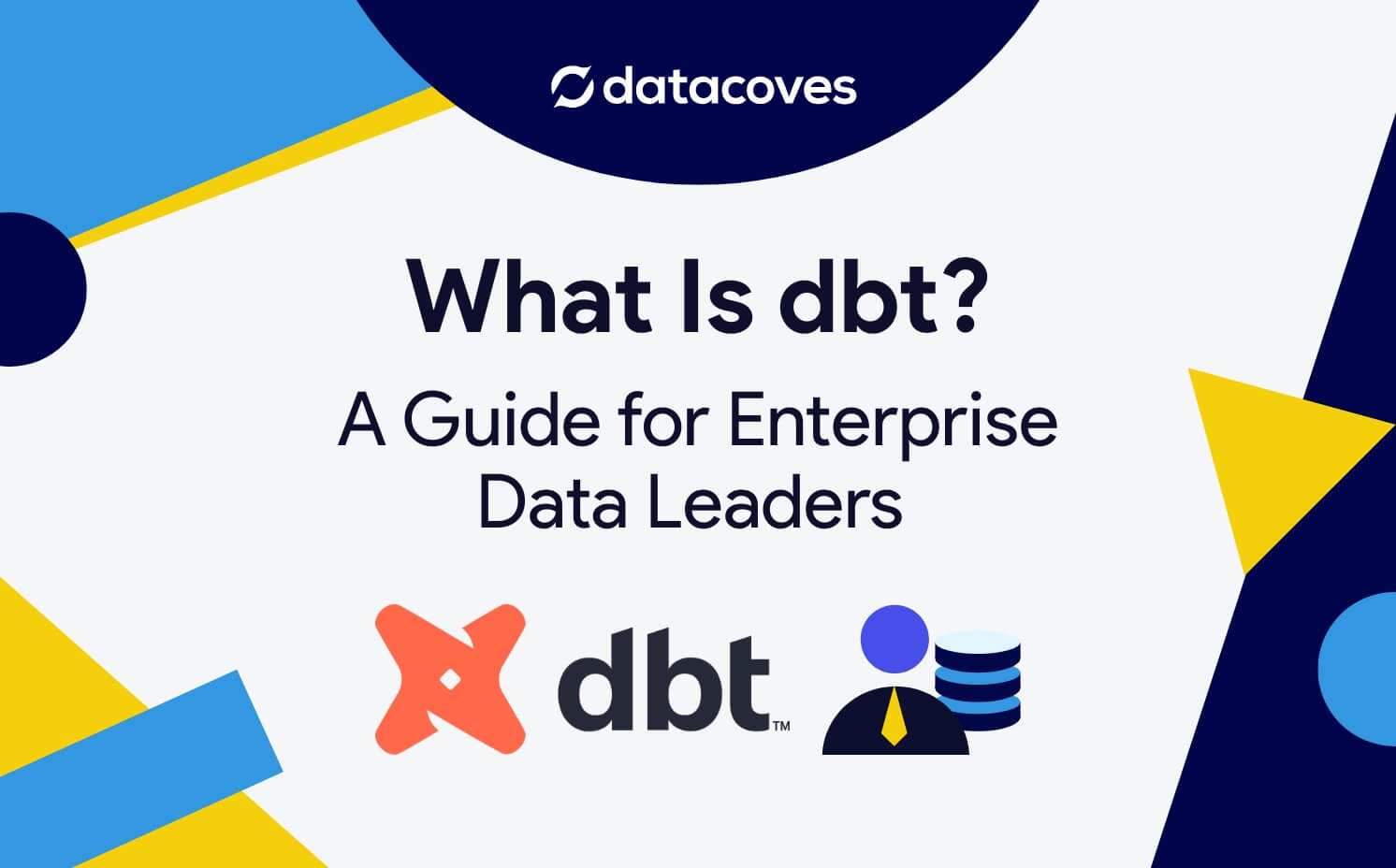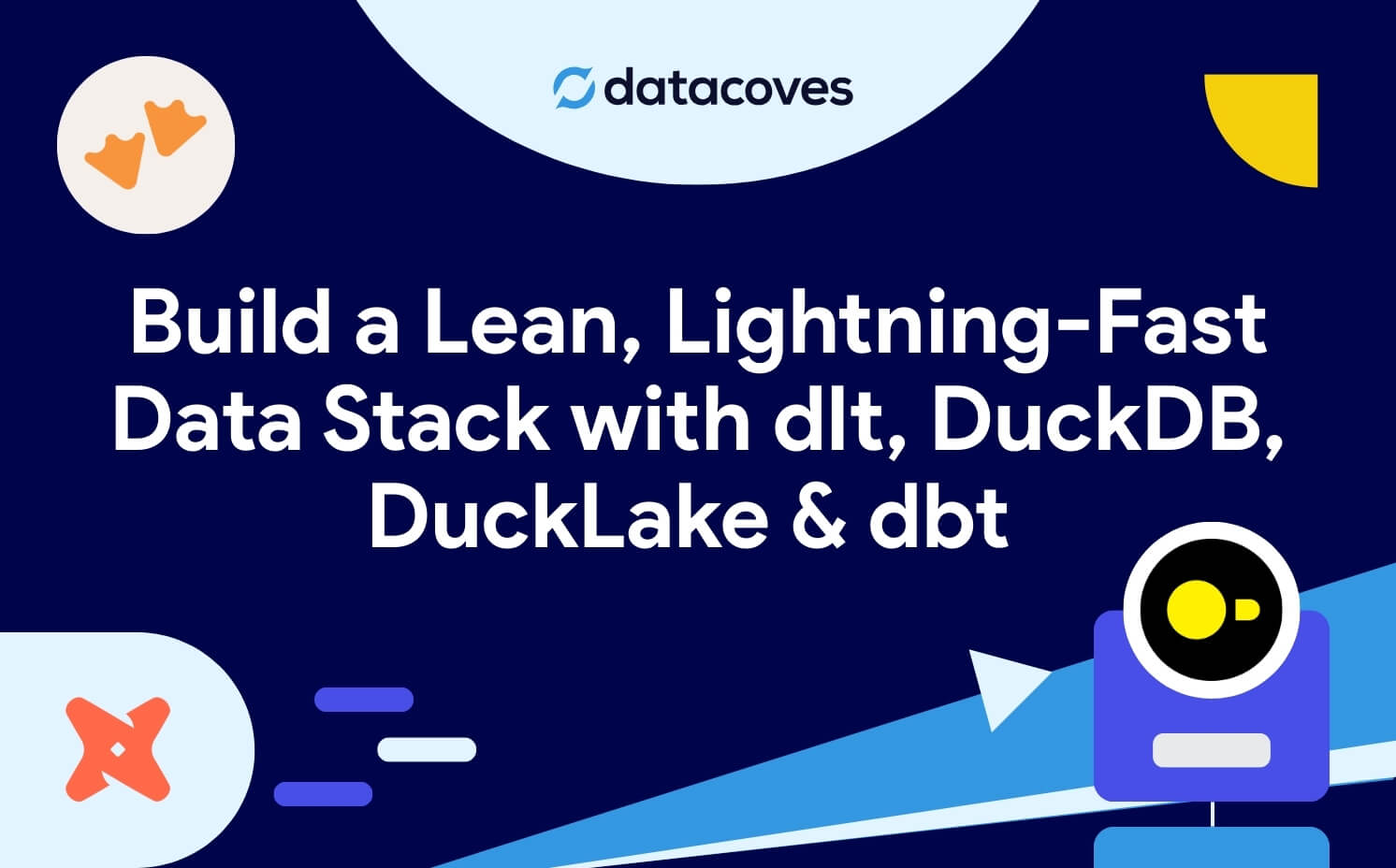The top dbt alternatives include Datacoves, SQLMesh, Bruin Data, Dataform, and visual ETL tools such as Alteryx, Matillion, and Informatica. Code-first engines offer stronger rigor, testing, and CI/CD, while GUI platforms emphasize ease of use and rapid prototyping. Teams choose these alternatives when they need more security, governance, or flexibility than dbt Core or dbt Cloud provide.
The top dbt alternatives include Datacoves, SQLMesh, Bruin Data, Dataform, and GUI-based ETL tools such as Alteryx, Matillion, and Informatica.
The top dbt alternatives we will cover are:
Why Teams Look for dbt Alternatives
Teams explore dbt alternatives when they need stronger governance, private deployments, or support for Python and code-first workflows that go beyond SQL. Many also prefer GUI-based ETL tools for faster onboarding. Recent market consolidation, including Fivetran acquiring SQLMesh and merging with dbt Labs, has increased concerns about vendor lock-in, which makes tool neutrality and platform flexibility more important than ever.
Teams look for dbt alternatives when they need stronger orchestration, consistent development environments, Python support, or private cloud deployment options that dbt Cloud does not provide.
Categories of dbt Alternatives

Organizations evaluating dbt alternatives typically compare tools across three categories. Each category reflects a different approach to data transformation, development preferences, and organizational maturity.
dbt Cloud Alternatives
Organizations consider alternatives to dbt Cloud when they need more flexibility, stronger security, or support for development workflows that extend beyond dbt. Teams comparing platform options often begin by evaluating the differences between dbt Cloud vs dbt Core.
Running enterprise-scale ELT pipelines often requires a full orchestration layer, consistent development environments, and private deployment options that dbt Cloud does not provide. Costs can also increase at scale (see our breakdown of dbt pricing considerations), and some organizations prefer to avoid features that are not open source to reduce long-term vendor lock-in.
This category includes platforms that deliver the benefits of dbt Cloud while providing more control, extensibility, and alignment with enterprise data platform requirements.
Datacoves
Datacoves provides a secure, flexible platform that supports dbt, SQLMesh, and Bruin in a unified environment with private cloud or VPC deployment.
Datacoves is an enterprise data platform that serves as a secure, flexible alternative to dbt Cloud. It supports dbt Core, SQLMesh, and Bruin inside a unified development and orchestration environment, and it can be deployed in your private cloud or VPC for full control over data access and governance.
Benefits
Flexibility and Customization:
Datacoves provides a customizable in-browser VS Code IDE, Git workflows, and support for Python libraries and VS Code extensions. Teams can choose the transformation engine that fits their needs without being locked into a single vendor.
Handling Enterprise Complexity:
Datacoves includes managed Airflow for end-to-end orchestration, making it easy to run dbt and Airflow together without maintaining your own infrastructure. It standardizes development environments, manages secrets, and supports multi-team and multi-project workflows without platform drift.
Cost Efficiency:
Datacoves reduces operational overhead by eliminating the need to maintain separate systems for orchestration, environments, CI, logging, and deployment. Its pricing model is predictable and designed for enterprise scalability.
Data Security and Compliance:
Datacoves can be deployed fully inside your VPC or private cloud. This gives organizations complete control over identity, access, logging, network boundaries, and compliance with industry and internal standards.
Reduced Vendor Lock-In:
Datacoves supports dbt, SQLMesh, and Bruin Data, giving teams long-term optionality. This avoids being locked into a single transformation engine or vendor ecosystem.
DIY dbt Core
Running dbt Core yourself is a flexible option that gives teams full control over how dbt executes. It is also the most resource-intensive approach. Teams choosing DIY dbt Core must manage orchestration, scheduling, CI, secrets, environment consistency, and long-term platform maintenance on their own.
Benefits
Full Control:
Teams can configure dbt Core exactly as they want and integrate it with internal tools or custom workflows.
Cost Flexibility:
There are no dbt Cloud platform fees, but total cost of ownership often increases as the system grows.
Considerations
High Maintenance Overhead:
Teams must maintain Airflow or another orchestrator, build CI pipelines, manage secrets, and keep development environments consistent across users.
Requires Platform Engineering Skills:
DIY dbt Core works best for teams with strong Kubernetes, CI, Python, and DevOps expertise. Without this expertise, the environment becomes fragile over time.
Slow to Scale:
As more engineers join the team, keeping dbt environments aligned becomes challenging. Onboarding, upgrades, and platform drift create operational friction.
Security and Compliance Responsibility:
Identity, permissions, logging, and network controls must be designed and maintained internally, which can be significant for regulated organizations.
dbt alternatives – Code based ETL tools
Teams that prefer code-first tools often look for dbt alternatives that provide strong SQL modeling, Python support, and seamless integration with CI/CD workflows and automated testing. These are part of a broader set of data transformation tools. Code-based ETL tools give developers greater control over transformations, environments, and orchestration patterns than GUI platforms. Below are four code-first contenders that organizations should evaluate.
Code-first dbt alternatives like SQLMesh, Bruin Data, and Dataform provide stronger CI/CD integration, automated testing, and more control over complex transformation workflows.
SQLMesh
SQLMesh is an open-source framework for SQL and Python-based data transformations. It provides strong visibility into how changes impact downstream models and uses virtual data environments to preview changes before they reach production.
Benefits
Efficient Development Environments:
Virtual environments reduce unnecessary recomputation and speed up iteration.
Considerations
Part of the Fivetran Ecosystem:
SQLMesh was acquired by Fivetran, which may influence its future roadmap and level of independence.
Dataform
Dataform is a SQL-based transformation framework focused specifically for BigQuery. It enables teams to create table definitions, manage dependencies, document models, and configure data quality tests inside the Google Cloud ecosystem. It also provides version control and integrates with GitHub and GitLab.
Benefits
Centralized BigQuery Development:
Dataform keeps all modeling and testing within BigQuery, reducing context switching and making it easier for teams to collaborate using familiar SQL workflows.
Considerations
Focused Only on the GCP Ecosystem:
Because Dataform is geared toward BigQuery, it may not be suitable for organizations that use multiple cloud data warehouses.
AWS Glue
AWS Glue is a serverless data integration service that supports Python-based ETL and transformation workflows. It works well for organizations operating primarily in AWS and provides native integration with services like S3, Lambda, and Athena.
Benefits
Python-First ETL in AWS:
Glue supports Python scripts and PySpark jobs, making it a good fit for engineering teams already invested in the AWS ecosystem.
Considerations
Requires Engineering Expertise:
Glue can be complex to configure and maintain, and its Python-centric approach may not be ideal for SQL-first analytics teams.
Bruin Data
Bruin is a modern SQL-based data modeling framework designed to simplify development, testing, and environment-aware deployments. It offers a familiar SQL developer experience while adding guardrails and automation to help teams manage complex transformation logic.
Benefits
Modern SQL Modeling Experience:
Bruin provides a clean SQL-first workflow with strong dependency management and testing.
Considerations
Growing Ecosystem:
Bruin is newer than dbt and has a smaller community and fewer third-party integrations.
dbt alternatives – Graphical ETL tools
While code-based transformation tools provide the most flexibility and long-term maintainability, some organizations prefer graphical user interface (GUI) tools. These platforms use visual, drag-and-drop components to build data integration and transformation workflows. Many of these platforms fall into the broader category of no-code ETL tools. GUI tools can accelerate onboarding for teams less comfortable with code editors and may simplify development in the short term. Below are several GUI-based options that organizations often consider as dbt alternatives.
GUI-based dbt alternatives such as Matillion, Informatica, and Alteryx use drag-and-drop interfaces that simplify development and accelerate onboarding for mixed-skill teams.
Matillion
Matillion is a cloud-based data integration platform that enables teams to design ETL and transformation workflows through a visual, drag-and-drop interface. It is built for ease of use and supports major cloud data warehouses such as Amazon Redshift, Google BigQuery, and Snowflake.
Benefits
User-Friendly Visual Development:
Matillion simplifies pipeline building with a graphical interface, making it accessible for users who prefer low-code or no-code tooling.
Considerations
Limited Flexibility for Complex SQL Modeling:
Matillion’s visual approach can become restrictive for advanced transformation logic or engineering workflows that require version control and modular SQL development.
Informatica
Informatica is an enterprise data integration platform with extensive ETL capabilities, hundreds of connectors, data quality tooling, metadata-driven workflows, and advanced security features. It is built for large and diverse data environments.
Benefits
Enterprise-Scale Data Management:
Informatica supports complex data integration, governance, and quality requirements, making it suitable for organizations with large data volumes and strict compliance needs.
Considerations
High Complexity and Cost:
Informatica’s power comes with a steep learning curve, and its licensing and operational costs can be significant compared to lighter-weight transformation tools.
Alteryx
Alteryx is a visual analytics and data preparation platform that combines data blending, predictive modeling, and spatial analysis in a single GUI-based environment. It is designed for analysts who want to build workflows without writing code and can be deployed on-premises or in the cloud.
Benefits
Powerful GUI Analytics Capabilities:
Alteryx allows users to prepare data, perform advanced analytics, and generate insights in one tool, enabling teams without strong coding skills to automate complex workflows.
Considerations
High Cost and Limited SQL Modeling Flexibility:
Alteryx is one of the more expensive platforms in this category and is less suited for SQL-first transformation teams who need modular modeling and version control.
Azure Data Factory (ADF)
Azure Data Factory (ADF) is a fully managed, serverless data integration service that provides a visual interface for building ETL and ELT pipelines. It integrates natively with Azure storage, compute, and analytics services, allowing teams to orchestrate and monitor pipelines without writing code.
Benefits
Strong Integration for Microsoft-Centric Teams:
ADF connects seamlessly with other Azure services and supports a pay-as-you-go model, making it ideal for organizations already invested in the Microsoft ecosystem.
Considerations
Limited Transformation Flexibility:
ADF excels at data movement and orchestration but offers limited capabilities for complex SQL modeling, making it less suitable as a primary transformation engine
Talend
Talend provides an end-to-end data management platform with support for batch and real-time data integration, data quality, governance, and metadata management. Talend Data Fabric combines these capabilities into a single low-code environment that can run in cloud, hybrid, or on-premises deployments.
Benefits
Comprehensive Data Quality and Governance:
Talend includes built-in tools for data cleansing, validation, and stewardship, helping organizations improve the reliability of their data assets.
Considerations
Broad Platform, Higher Operational Complexity:
Talend’s wide feature set can introduce complexity, and teams may need dedicated expertise to manage the platform effectively.
SSIS (SQL Server Integration Services)
SQL Server Integration Services is part of the Microsoft SQL Server ecosystem and provides data integration and transformation workflows. It supports extracting, transforming, and loading data from a wide range of sources, and offers graphical tools and wizards for designing ETL pipelines.
Benefits
Strong Fit for SQL Server-Centric Teams:
SSIS integrates deeply with SQL Server and other Microsoft products, making it a natural choice for organizations with a Microsoft-first architecture.
Considerations
Not Designed for Modern Cloud Data Warehouses:
SSIS is optimized for on-premises SQL Server environments and is less suitable for cloud-native architectures or modern ELT workflows.
Why These dbt Alternatives Exist: The Full Context
Recent consolidation, including Fivetran acquiring SQLMesh and merging with dbt Labs, has increased concerns about vendor lock-in and pushed organizations to evaluate more flexible transformation platforms.
Organizations explore dbt alternatives when dbt no longer meets their architectural, security, or workflow needs. As teams scale, they often require stronger orchestration, consistent development environments, mixed SQL and Python workflows, and private deployment options that dbt Cloud does not provide.
Some teams prefer code-first engines for deeper CI/CD integration, automated testing, and strong guardrails across developers. Others choose GUI-based tools for faster onboarding or broader integration capabilities. Recent market consolidation, including Fivetran acquiring SQLMesh and merging with dbt Labs, has also increased concerns about vendor lock-in.
These factors lead many organizations to evaluate tools that better align with their governance requirements, engineering preferences, and long-term strategy.
Should You DIY a dbt Data Platform?
DIY dbt Core offers full control but requires significant engineering work to manage orchestration, CI/CD, security, and long-term platform maintenance.
Running dbt Core yourself can seem attractive because it offers full control and avoids platform subscription costs. However, building a stable, secure, and scalable dbt environment requires significantly more than executing dbt build on a server. It involves managing orchestration, CI/CD, and ensuring development environment consistency along with long-term platform maintenance, all of which require mature DataOps practices.
The true question for most organizations is not whether they can run dbt Core themselves, but whether it is the best use of engineering time. This is essentially a question of whether to build vs buy your data platform. DIY dbt platforms often start simple and gradually accumulate technical debt as teams grow, pipelines expand, and governance requirements increase.
When DIY Makes Sense
- The team has strong platform engineering expertise
- Pipelines are relatively simple
- Security and compliance needs are minimal
- The organization prefers to own and operate every part of the stack
When DIY Becomes a Liability
- Multiple analytics engineers need consistent development environments
- Governance, auditing, or private deployment become required
- Pipelines need enterprise-grade orchestration
- Upgrades and maintenance begin consuming valuable engineering time
For many organizations, DIY works in the early stages but becomes difficult to sustain as the platform matures.
How to Choose the Right dbt Alternative
The right dbt alternative depends on your team’s skills, governance requirements, pipeline complexity, and long-term data platform strategy.
Selecting the right dbt alternative depends on your team’s skills, security requirements, and long-term data platform strategy. Each category of tools solves different problems, so it is important to evaluate your priorities before committing to a solution.
1. Team Skills and Workflow Preferences
- SQL-first teams: Tools like dbt and Dataform work well for analysts and analytics engineers.
- Engineering-first teams: SQLMesh, and AWS Glue offer deeper CI integration, testing, and Python support.
- Mixed-skill teams: GUI tools like Matillion, Informatica, and Alteryx provide visual development.
2. Governance and Security Requirements
- Need for private cloud or VPC deployment
- Centralized identity and access management
- Audit logging and compliance standards
- Ability to control data movement and network boundaries
If these are priorities, a platform with secure deployment options or multi-engine support may be a better fit than dbt Cloud.
3. Complexity of Pipelines
- Simple pipelines may work with lightweight tools
- Complex, multi-team pipelines benefit from strong orchestration, consistent environments, and guardrails
- SQL-only tools may fall short when pipelines require Python-based logic or mixed-language workflows
4. Integration and Ecosystem Compatibility
- Choose a tool that integrates cleanly with your cloud environment and data warehouse
- Engineering-forward teams may prioritize CI/CD and Git workflows
- Analytics-focused or traditional Data Engineering teams may value GUI tools
5. Vendor Lock-In and Long-Term Flexibility
Recent consolidation in the ecosystem has raised concerns about vendor dependency. Organizations that want long-term flexibility often look for:
- Multi-engine support
- Open-source components
- Tooling that can be run in their cloud environment
6. Total Cost of Ownership
Consider platform fees, engineering maintenance, onboarding time, and the cost of additional supporting tools such as orchestrators, IDEs, and environment management
Final dbt alternative Recommendation

dbt remains a strong choice for SQL-based transformations, but it is not the only option. As organizations scale, they often need stronger orchestration, consistent development environments, Python support, and private deployment capabilities that dbt Cloud or DIY dbt Core may not provide. Evaluating alternatives helps ensure that your transformation layer aligns with your long-term platform and governance strategy.
Code-first tools like SQLMesh, Bruin Data, and Dataform offer strong engineering workflows, while GUI-based tools such as Matillion, Informatica, and Alteryx support faster onboarding for mixed-skill teams. The right choice depends on the complexity of your pipelines, your team’s technical profile, and the level of security and control your organization requires.
Datacoves provides a flexible, secure alternative that supports dbt, SQLMesh, and Bruin in a unified environment. With private cloud or VPC deployment, managed Airflow, and a standardized development experience, Datacoves helps teams avoid vendor lock-in while gaining an enterprise-ready platform for analytics engineering.
Selecting the right dbt alternative is ultimately about aligning your transformation approach with your data architecture, governance needs, and long-term strategy. Taking the time to assess these factors will help ensure your platform remains scalable, secure, and flexible for your future needs.
FAQ
Can you run dbt without dbt Cloud?
Yes. dbt is open source and can run anywhere. The challenge is everything around it: you need an orchestrator (typically Airflow), a CI/CD pipeline, secret management, a consistent development environment, and a deployment process. Teams that build this themselves often spend months on platform engineering before delivering any business value. Platforms like Datacoves provide all of this preconfigured and managed, so you get the benefits of dbt Core without the overhead of building and maintaining the surrounding infrastructure.
How do GUI-based ETL tools like Matillion compare to dbt?
GUI-based tools like Matillion, Informatica, and Azure Data Factory are designed for technical data engineering teams that prefer visual, drag-and-drop pipeline development. However they trade flexibility for expected ease of use. Complex SQL modeling, version control workflows, and automated testing are harder to implement in a GUI environment. Code-first tools like dbt are a better fit for engineering-driven teams who need modular models, CI/CD integration, and strong data quality guarantees. dbt also enables IT and advanced business users to use common tooling and guardrails creating a more integrated process.
How does Datacoves differ from dbt Cloud?
The core difference is deployment model and platform scope. dbt Cloud is a SaaS product that hosts a development environment and manages your dbt runs. Datacoves deploys entirely inside your own private cloud or VPC, so your data never leaves your environment. Beyond security, Datacoves includes managed Airflow for production orchestration, a personal Airflow sandbox for development, an in-browser VS Code IDE with full extension support, Python virtual environments, Git integration, and pre-built CI/CD. It also supports other transformation engines, giving teams long-term flexibility without being locked into a single vendor ecosystem.
Is dbt Core still worth using after the Fivetran acquisition?
dbt Core remains a capable transformation framework. The concern is not what it does today but where it is heading. Fivetran now controls both dbt Labs and SQLMesh, which concentrates decision-making in a single commercial entity with a clear incentive to drive users toward paid products. Teams that want to reduce their exposure to that risk are investing in platforms that run dbt Core without depending on Fivetran's commercial roadmap.
What are the best dbt alternatives in 2026?
The top dbt alternatives depend on what you need. For teams that want to keep using dbt but need private cloud deployment and better orchestration, Datacoves is the strongest option. For teams that prefer a visual interface, Matillion, Informatica, and Azure Data Factory are the most mature options. The right choice depends on your team's technical profile, security requirements, and how much operational overhead you can absorb.
What dbt alternative is best for regulated industries like healthcare or finance?
Teams in regulated industries need private cloud or VPC deployment, no data leaving their network, SSO and SAML integration, audit logging, and controlled access to internal databases. Most SaaS-based dbt alternatives cannot meet these requirements because they require data to transit through vendor infrastructure. Datacoves is purpose-built for this use case: it deploys entirely inside your own cloud account, requires no VPC peering, and integrates with your existing identity and access controls. This makes it the most common choice for pharma, healthcare, finance, and government data teams.
What is SQLMesh and how does it compare to dbt?
SQLMesh is an open-source SQL transformation framework. Its key differentiator is virtual data environments, which allow teams to preview changes before they reach production without rebuilding every model from scratch. It also detects dependencies by inspecting SQL directly, removing the need for source and ref macros. The important caveat: Fivetran acquired SQLMesh in 2025, the same company that merged with dbt Labs. Both tools now sit under the same parent, which raises questions about the SQLMesh development going forward and the long term evolution of the SQLMesh project.
What is the difference between dbt Core and dbt Cloud alternatives?
dbt Core is the open-source transformation framework that runs SQL-based models in your warehouse. Alternatives to dbt Cloud are different: they keep dbt Core but replace the commercial hosting layer with a platform that offers more control, better orchestration, or private deployment. Datacoves falls into this second category. It runs dbt inside a fully managed environment deployed in your own cloud, without the SaaS lock-in of dbt Cloud.
Why do teams move away from dbt Cloud?
The most common reasons are pricing unpredictability, SaaS-only deployment that doesn't meet compliance requirements, limited orchestration capabilities, and the lack of a consistent development environment across engineering teams. dbt Cloud's scheduler handles basic runs but cannot manage complex cross-system dependencies. Teams that need Airflow-level orchestration, private cloud deployment, or a standardized VS Code environment for all engineers typically look for a platform that provides those capabilities alongside managed dbt.



-Photoroom.jpg)




